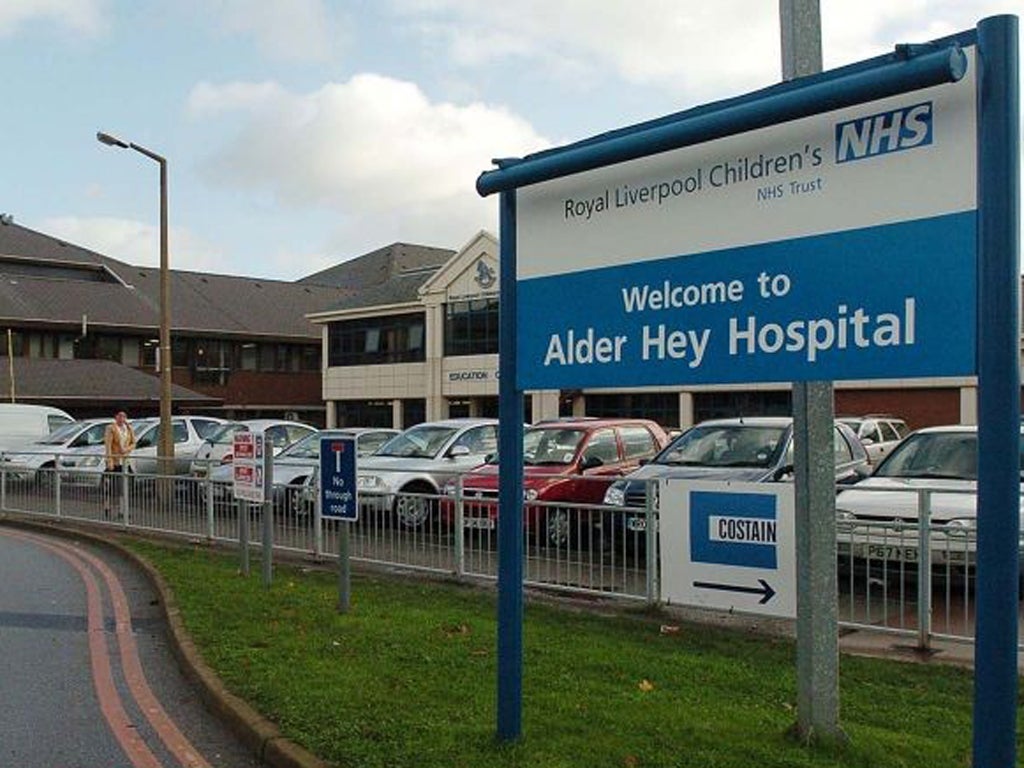Alder Hey is no longer a 'world class' hospital
Royal College of Surgeons criticises Europe's largest children's unit over paediatric surgical care

Your support helps us to tell the story
From reproductive rights to climate change to Big Tech, The Independent is on the ground when the story is developing. Whether it's investigating the financials of Elon Musk's pro-Trump PAC or producing our latest documentary, 'The A Word', which shines a light on the American women fighting for reproductive rights, we know how important it is to parse out the facts from the messaging.
At such a critical moment in US history, we need reporters on the ground. Your donation allows us to keep sending journalists to speak to both sides of the story.
The Independent is trusted by Americans across the entire political spectrum. And unlike many other quality news outlets, we choose not to lock Americans out of our reporting and analysis with paywalls. We believe quality journalism should be available to everyone, paid for by those who can afford it.
Your support makes all the difference.A report into surgical standards at Europe's largest children's hospital, which was prompted by the concerns of two whistleblowers, has found that it no longer provides "world-class" care.
The Royal College of Surgeons (RCS) was asked by Alder Hey hospital in Liverpool to review 20 cases covering a six-year period after concerns were raised about performance in the paediatric surgery department, as reported in The Indepdendent On Sunday.
Following a visit in May, the RCS team found the hospital was providing a "safe surgical service" but that it was no longer a national leader.
The RCS report said that in five cases the care was "sub-optimal" or the clinical governance appeared weak. It also highlighted inadequate consent procedures, failure to robustly assess trainees and delays in reviewing deaths.
The RCS found that the management and investigation of whistleblowers' disclosures "had not been optimal" and urged Alder Hey Children's NHS Foundation Trust to review its policies.
The RCS made 24 recommendations in August, to be implemented by the trust within three to six months. These include more support for consultants and a review of operation consent practices, especially in relation to new surgical techniques.
It also advised that all deaths be reviewed within eight weeks rather than the 12 months it can currently take. According to the report, managers admitted last year that Alder Hey's regular mortality and morbidity meetings were not fit for purpose; a new system has been in place since February.
The report said: "Alder Hey is not attaining world-class standards of care or... research in the department of paediatric surgery... although it has been acknowledged to be a national leader in the past, on the evidence the panel reviewed relating to clinical case management, clinical governance and research output, the department would not merit such a ranking today."
Louise Shepherd, the chief executive, said the recommendations were helpful and the trust had started "putting actions in place to ensure Alder Hey continues to be a leading children's trust".
Both whistleblowers had also raised their concerns with the Care Quality Commision, which said: "We will now inspect unannounced and seek further assurance that they are taking these concerns seriously. If we are not satisfied, we may consider enforcement action."
Alder Hey: The history
1914 Alder Hey opens, intended as a workhouse for infirm paupers.
1941 The world's first neonatal surgical unit opens there.
1999 Alder Hey's part in the national organ retention scandal comes to light. Body parts from 800 infants and 1,500 foetuses were retained and stored without permission.
2001 Redfern report criticises bosses at Alder Hey for failing to supervise a rogue pathologist and not properly dealing with complaints.
2003 A £5m out-of-court settlement is reached for organ scandal families.
2004 Concerns are raised about trainee surgeon Pierina Kapur by her colleagues. She qualifies as a consultant in 2005 but goes on to accidentally remove the wrong organ from a baby in 2008.
2007 Whistleblowers start raising concerns about surgery department.
Jan 2011 The Independent on Sunday publishes a year-long investigation into the bullying culture and safety procedures in the surgery unit. Alder Hey denies the allegations.
May 2011 The Royal College of Surgeons conduct a week-long site review, leading to to 24 recommendations.
Nov 2011 RCS report concludes that Alder Hey surgery department is no longer "world class".
Join our commenting forum
Join thought-provoking conversations, follow other Independent readers and see their replies
Comments